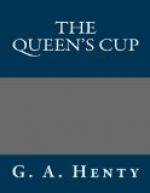“Well, Marshall,” he said on the evening of the day when the way was open to the Residency; “you have not cheated your creditor, I see.”
“No, Captain Mallett. I thought of him when those fellows in the mosque were keeping such a heavy fire upon us as we were waiting to get into the Secunderbagh. It seemed to me that his chance of ever getting his money was not worth much. How the bullets did whizz about! I felt sure that we should be all mown down before we could get under the shelter of the wall.
“I don’t think I shall ever feel afraid in battle again. One gets to see that musketry fire is not so very dangerous after all. If it were, very few of us would have got through the three days’ fighting alive, whereas the casualties only amount to one-tenth of the force engaged. I am very sorry you are wounded.”
“Oh, my wound is a mere trifle. I scarcely felt it until the sergeant next to me said, ’You are wounded in the arm, Captain Mallett.’ The doctor says that it narrowly missed the bone, but in this case a miss is as good as a mile. I am very sorry about Hatchard and Rivers and Miles. They were all good fellows, and when this excitement is over we shall miss them sadly. It will give you your step.”
“Yes, I won’t say that it is lucky, for one cannot forget how it has been gained. Still it is a good lift for me, for there are two or three down for purchase below me, and otherwise I should have had to wait a long time. It puts you one higher on the list, Captain Mallett.”
“I am going to clear out altogether as soon as the fighting is all over, so whether I am fourth or fifth on the list makes no difference whatever to me.”
“Still it is a great satisfaction to have been through this and to have taken one’s share in the work of revenge. It was a horrible business in the Secunderbagh, though one did not think of it at the time. The villains richly deserved what they got, but I own that I should not care to go into the place again. They must have suffered tremendously altogether. The Colonel said this afternoon that he found their loss had been put down as at least six or seven thousand.”
The regiment took its full share in the work that followed the relief of Lucknow, portions being attached to each of the flying columns which scoured Oude, defeated Kunwer Singh, and drove the rebels before them wherever they encountered them.
In the beginning of February the vacancies in the ranks were filled up by a draft from England. The work had been fatiguing in the extreme, but the men were as a rule in splendid health, the constant excitement preventing their suffering from the effect of heat or attacks of fever.
Two companies which had been away from the headquarters of the regiment for six weeks, found on their return a number of letters awaiting them, the first they had received since leaving England. Captain Mallett, who commanded this detachment, found one from Sir John Greendale, written after the receipt of his letter from Cawnpore.




